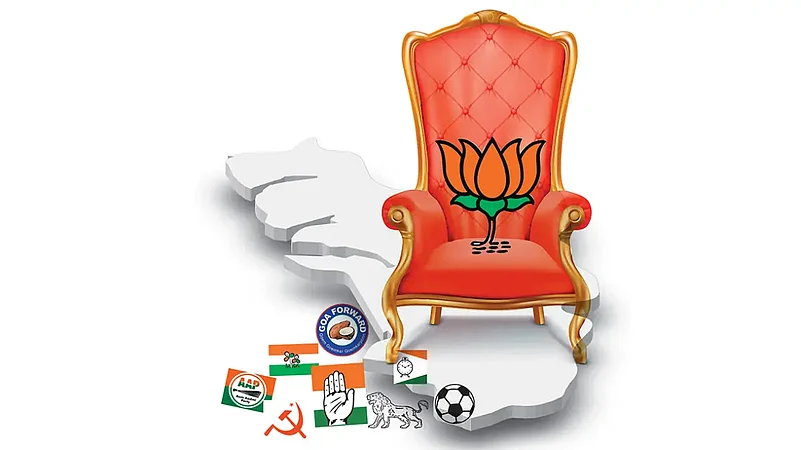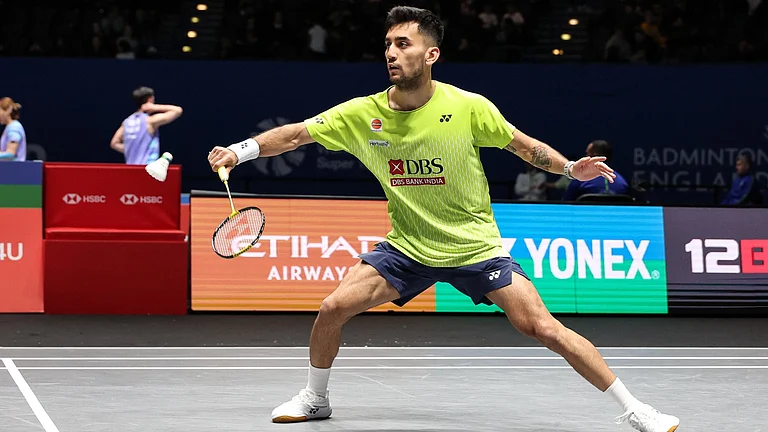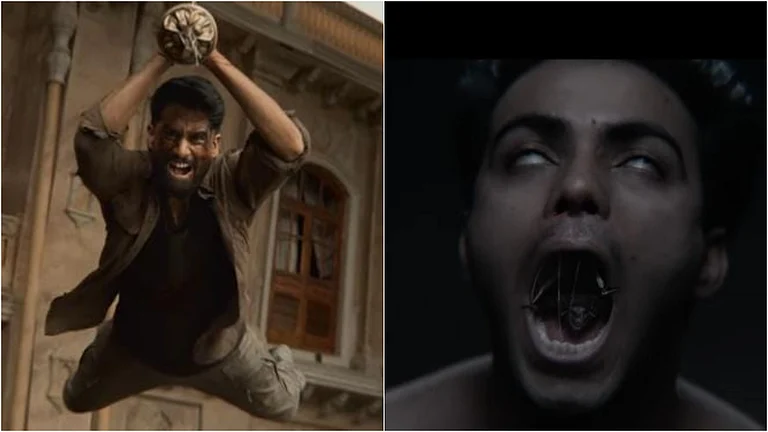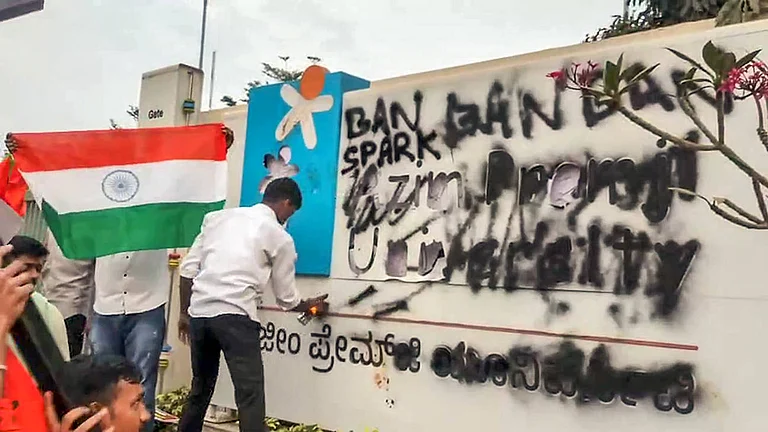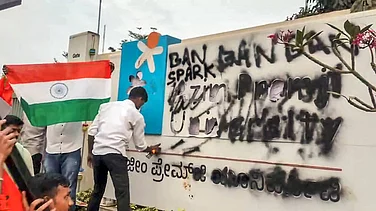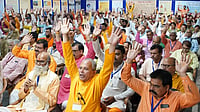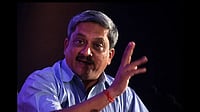Congressman and another in the line of many chief ministerial hopefuls, Michael Lobo, had gone for a run on Bambolim beach, a less popular, and more rocky than sandy stretch in North Goa, on the morning of March 9. The former BJP Minister, who recently joined the Congress to cash in on a seemingly rising wave of anti-incumbency, tweeted a confident photograph of himself wearing a tee and a pair of track pants at the empty beach with two mongrels lazing in the backdrop.
By the afternoon of March 10, his party, the Congress, had ended its electoral run, falling far short of its majority aspirations. The night before, several of the 37 Congress candidates who were herded and shacked up together by the party at a nearby resort, could not have been blamed for wet dreaming visions of political success. Confident of a win, the party leaders had even sought an appointment with Goa Governor P.S. Sreedharan Pillai at 3 pm on Thursday (March 10), hoping that by then the party would have won enough seats to make a bid for power.
On March 10, the Congress woke up from its cosy dream to stare wide-eyed into a nightmare. The unusually severe split in the opposition poll kitty saw votes scooped out by an aggressive Trinamool Congress (TMC), a resurgent Aam Aadmi Party (AAP) and the debutant nativist party, Revolutionary Goans Party (RGP). Overall, the Bharatiya Janata Party (BJP) surpassed Congress in the seat count. The BJP won 20 seats in the 40-member state legislative assembly. For the one seat it needs to reach the majority mark, it has the support of three independent candidates and two MLAs from the Maharashtrawadi Gomantak Party. Confident of the number game, the BJP seems to be in no hurry to stake claim for power. After all, its MLAs only have to occupy the familiar treasury benches that lawmakers have lorded over the last decade.
For the first time since 1994, the Goa assembly, when it is convened to test the floor strength of the new BJP-led regime, would feature three women. BJP’s Deviya Rane won the Poriem assembly seat by a whopping (whopping by electoral standards in the country’s smallest state with its constituencies the size of municipal wards in metropolitan cities) margin of 13,374 votes. Jennifer Monserrate, also from BJP, won the Taleigao assembly seat, while Delilah Lobo from Congress won the Siolim assembly constituency. A recent Outlook story had raised questions on why a seemingly progressive state with health social indices rarely returned women legislators in electoral politics in Goa. Even when women legislators get elected in Goa, they are perceived as meek extensions of their spouses’ political careers.
While the new assembly boasts of three women lawmakers, all three are spouses of well-known politicians. Deviya is the wife of health minister Vishwajit Rane and the daughter-in-law of former Congress CM Pratapsingh Rane, Jennifer’s significant other is BJP MLA Atanasio Monserrate and Delilah’s husband is Congress MLA Michael Lobo. Two other couples who contested the polls, namely the Kandolkars, Kiran and his wife Kavita representing TMC, and the Kavlekars, Chandrakant (BJP) and Savitri (IND), lost the elections. Another father-daughter duo, the Alemaos, Churchill and Valanka, who contested on TMC tickets, lost the polls.

The state assembly will also witness AAP’s debut in Goa. The party’s otherwise dismal performance saw its chief ministerial candidate and noted criminal lawyer Amit Palekar, lose his debut election. However, it managed to send an engineer Cruz Silva (Velim constituency) and a maritime captain Venzy Viegas to the state assembly. Soon after the model code of conduct was imposed in Goa in January this year, hundreds of hoardings and countless banners featuring West Bengal Chief Minister and TMC founder Mamata Banerjee disappeared from sight. On March 10, when the election results were announced in Goa, not one of the party’s 26 candidates featured in the list of winners. However, TMC did damage the Congress’ prospects in several constituencies, especially those with large clusters of Congress-coveted Catholic votes.
According to Lobo, the split in the opposition votes by TMC, AAP and RGP was unexpectedly king-size, a factor that crushed Congress aspirations of coming to power. “People stepped out in big numbers, but votes were split, in some cases five-ways. We came close (to winning) in many seats. We had confidence (about winning), but we did not know the votes would be split,” Lobo says, while justifying the Congress’ performance. The Navelim constituency is a classic example of how an opposition vote split largely worked in BJP’s favour. This territory in South Goa is located in a cluster of eight seats in the Salcete sub district. It is a part of the Portuguese old conquest regions, where the European colonial power first unleashed Christianity to save souls and further trade and dominion. Largely Catholic in religious orientation, Salcete once considered a Congress citadel, is developing chinks in recent times.
In Navelim, the Congress candidate and former cabinet minister Avertano Furtado polled 3,716 votes, NCP’s Mohammad Rehan Mujawar polled 2,609 votes, TMC’s Valanka Alemao got 4,682 votes, AAP’s Pratima Betsy Coutinho got 2,297 votes, while Bento Da Silva of Revolutionary Goans Party (RGP) polled 2,068 votes. All the above contested the polls on an anti-BJP plank. Enter Ulhas Tuenkar from BJP. A virtually unknown entity, largely familiar with the cadre faithful, Tuenkar polled 5,084 to win the seat by a mere 402 votes. Apart from a BJP candidate winning for the first time in what was once a Congress comfort zone, it is also the first time Navelim has returned a Hindu candidate from any political party.

This election was one where a split in opposition votes led to victories and defeats with the slimmest of margins. Former Chief Minister and BJP candidate Ravi Naik won the Ponda seat by 77 votes; RGP’s Viresh Borkar defeated BJP’s Francisco Silveira by 76 votes for the St Andre seat and AAP’s Cruz Silva defeated Congress’ Savio D’Silva by 169 votes for the Velim seat.
Even as the entry of the AAP, rare presence of three women lawmakers and a rout of eight ‘defector’ MLAs altered the composition of the state assembly, the presence of RGP MLA Borkar could bring a new lease of life to the issue of the state’s changing identity in the legislative business. The nativist party founded by geologist Manoj Parab, RGP represents a new dialogue in state politics. Styled on the lines of a vintage Shiv Sena, its main poll plank is the rapid dilution of Goa’s identity due to unplanned development and rampant in-migration.
Often accused of being coarse and slandering Goa’s large immigrant population, RGP, like the TMC and AAP, succeeded in causing severe dents in the Congress vote bank, in mainly minority-dominated constituencies. The party’s raw, emotional pitch seems to have caught on in its debut election.
While only one RGP candidate won, the party’s other candidates performed creditably in several other constituencies, even coming second or third, drawing a less than 10 per cent vote share. The vexed issue of retaining Goa’s unique socio-cultural identity has featured in assembly debates, but RGP’s straight-from-the heart articulation appears to have sunk much deeper into the electorate.
After Congress and TMC, the next biggest loser of Goa polls appears to be the Maharashtrawadi Gomantak Party (MGP), headed by the Brahmin brothers Sudin and Deepak Dhavalikar. MGP contested in alliance with TMC. Exit poll results showed the MGP-TMC alliance was billed to win between 5-9 seats. But with TMC drawing nought and MGP winning just two seats, the Dhavalikars’ aspirations of becoming kingmakers may evaporate. But these elections have thrown up a ‘Maratha king’, Chief Minister Pramod Sawant. He may have been lucky with the overcrowded opposition hacking at each other’s prospects, but the fact remains that securing 20 seats on its own steam without entering into an alliance is the BJP’s best electoral return yet. Even former Chief Minister Manohar Parrikar’s 2012 campaign where BJP won a simple majority of 21 seats was with the assistance of MGP as an alliance partner.
The era of Sawant may have just begun once again in Goa, an era which may finally see the back of the question ‘After Parrikar, who?’, a taunt often thrown at the Chief Minister, who has been accused of marring Manohar Parrikar’s legacy. Sawant may not even need to merit such a taunt with a response now. All he needs to point out is this statistic about Goa’s capital city—Atanasio Monserrate (BJP) 6,531 defeats Utpal Parrikar (Ind) 5,857 in Panaji assembly polls—that was Manohar Parrikar’s bastion from 1994 till his death in 2019.
(This appeared in the print edition as "Shifting Tides")
ALSO READ



